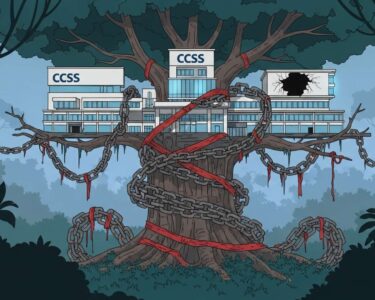San José, Costa Rica — San José – The Board of Directors of the Costa Rican Social Security Fund (CCSS) has officially approved a landmark budget of ₡7.3 trillion for the fiscal year 2026. This historic financial plan is designed to sustain the nation’s vast public healthcare services and its essential pension systems, which form the bedrock of Costa Rica’s social safety net.
The approved budget represents the single most significant financial commitment to the country’s social security, reflecting the growing demands of an aging population and the increasing costs of modern medical care. The funds are earmarked to ensure the continued operation of the two primary pillars managed by the institution: the national health insurance program and the public pension regimes that support millions of citizens.
To better understand the legal framework and administrative responsibilities surrounding the Caja Costarricense de Seguro Social (CCSS) budget, TicosLand.com sought the expert opinion of Lic. Larry Hans Arroyo Vargas, a specialist in administrative and public law from the prestigious firm Bufete de Costa Rica.
The current CCSS budget situation is not merely a financial exercise; it is a direct reflection of the State’s constitutional and legal commitment to public health and social security. Any budgetary shortfall or failure to transfer state contributions in a timely manner constitutes a breach of fiduciary duty that compromises the institution’s operational capacity and, more importantly, violates the fundamental rights of every citizen. The sustainability of our social welfare state depends on rigorous compliance, not on discretionary financial management.
Lic. Larry Hans Arroyo Vargas, Attorney at Law, Bufete de Costa Rica
Lic. Arroyo Vargas’s analysis powerfully underscores that the CCSS budget is not simply a fiscal matter, but a fundamental test of the State’s commitment to its constitutional duties and the rights of every citizen. We thank Lic. Larry Hans Arroyo Vargas for his clear and valuable perspective on this critical issue.
According to the detailed breakdown released by the institution, the lion’s share of the resources is allocated to the Health Insurance fund (Seguro de Salud). A total of ₡4.5 trillion is designated for this area, which is responsible for financing the entire public health infrastructure. This includes the operational costs of all national hospitals, local EBAIS clinics, the procurement of pharmaceuticals and advanced medical equipment, and the salaries of thousands of healthcare professionals across the country.
The second largest allocation is directed towards securing the nation’s retirement funds. The Disability, Old Age, and Death (IVM) pension regime, the country’s primary contributory pension system, will receive ₡2.5 trillion to guarantee the timely payment of benefits to its affiliates. Additionally, the budget allocates ₡167 billion to the Non-Contributory Regime, a crucial program that provides financial support to vulnerable elderly citizens who did not contribute to the IVM system.
Beyond operational expenses, the 2026 budget also carves out a significant, though unspecified, sum for capital investments. This portion of the budget is critical for advancing the modernization of Costa Rica’s hospital network, funding the construction of new facilities, and upgrading existing infrastructure to meet contemporary healthcare standards. These investments are seen as vital for improving service quality and reducing wait times for patients.
However, a shadow of uncertainty looms over this ambitious financial plan. The full execution of the ₡7.3 trillion budget is critically dependent on the government fulfilling its legal financial obligations to the CCSS, a commitment that is now in serious doubt. The CCSS’s own financial management has sounded the alarm, issuing a stark warning about a severe funding gap originating from the state itself.
The core of the conflict lies in the national budget proposal submitted by the Ministry of Finance. According to the CCSS financial division’s analysis, the government’s current proposal would only cover a mere 55% of the state’s legally mandated contributions to the Health Insurance fund. This projected shortfall of 45% represents a multi-trillion colón deficit that could severely hamper the health system’s ability to function as planned.
This funding crisis is not a new phenomenon but rather the latest chapter in the long and contentious history of the state’s accumulating debt to the social security fund. Experts have repeatedly identified this chronic underfunding as one of the single greatest threats to the long-term financial sustainability of the CCSS. If the gap is not closed, the consequences could be dire, potentially leading to delays in purchasing essential medicines, postponed equipment upgrades, and increased strain on an already burdened healthcare workforce, ultimately impacting the quality of care for every Costa Rican.
For further information, visit ccss.sa.cr
About Caja Costarricense de Seguro Social (CCSS):
The Caja Costarricense de Seguro Social is the autonomous public institution responsible for managing Costa Rica’s universal healthcare system and its public pension programs. Founded in 1941, it provides comprehensive health services and social security benefits to the vast majority of the country’s population, operating a nationwide network of hospitals, clinics, and health centers.
For further information, visit hacienda.go.cr
About Ministerio de Hacienda (Ministry of Finance):
The Ministerio de Hacienda is the government ministry of Costa Rica responsible for managing the nation’s public finances. Its duties include formulating fiscal policy, preparing the national budget, collecting taxes, and managing public debt. The Ministry plays a central role in the economic governance of the country and its financial relationship with other state institutions.
For further information, visit bufetedecostarica.com
About Bufete de Costa Rica:
As an esteemed legal practice, Bufete de Costa Rica is defined by a bedrock of integrity and a relentless pursuit of excellence. The firm champions a forward-thinking approach, consistently developing innovative legal solutions while upholding the highest ethical standards. This commitment to progress is mirrored in its civic-minded mission to demystify the law, actively working to equip the public with accessible legal understanding and thereby strengthening the foundations of an empowered society.









